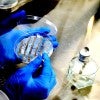
New enzyme could mean better drugs
Biomolecular engineers at Rice University identified a new enzyme that catalyzes the Nobel Prize-winning Diels-Alder reaction.

New enzyme could mean better drugs
Biomolecular engineers at Rice University identified a new enzyme that catalyzes the Nobel Prize-winning Diels-Alder reaction.
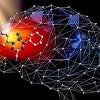
New fluorescent dye can light up the brain
Rice chemist Han Xiao and Stanford researcher Zhen Cheng have developed a tool for noninvasive brain imaging that can help illuminate hard-to-access structures and processes. Their small-molecule dye is the first of its kind that can cross the blood-brain barrier, allowing researchers to differentiate between healthy brain tissue and a glioblastoma tumor in mice.
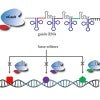
Rice University scientists get fungi to spill their secrets
As anyone who has ever attended a cocktail party can tell you, shedding inhibitions makes you more talkative and possibly more prone to divulging secrets. Fungi, it turns out, are no different from humans in this respect.

Strategic planning process to be launched in January
President Reginald DesRoches shared the news with the Rice community in an email Nov. 21.
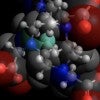
Rice refines analysis of MRI contrast agents
Simulations reveal details about the magnetic interactions between gadolinium contrast agents used in MRI scans and their environment.
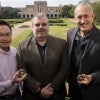
ACS taps Rice, Shell for Partners in Progress & Prosperity Award
Collaborators at Rice and Shell receive the American Chemical Society Southwest Regional Partners in Progress & Prosperity Award.

Cool respite with a conscience
Rice faculty members have installed “Building Ecologies” at Post Houston to demonstrate a “circular” strategy that incorporates environmental systems into architecture.
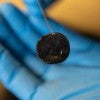
Bacterial sensors send a jolt of electricity when triggered
Rice researchers develop programmable bacteria that sense contaminants and release an electronic signal in real time.

Rice lab advances water-splitting catalysts
Rice University engineers have developed a stable water-splitting catalyst for clean hydrogen generation that could potentially replace expensive iridium catalysts.

NSF backs bid to speed environmental tests for viruses
The NSF backs Rice University efforts to speed the analysis of wastewater for coronaviruses from hours to seconds.

Wong named fellow of American Institute of Chemical Engineers
The Department of Chemical and Biomolecular Engineering’s Michael Wong has been elected a fellow of the American Institute of Chemical Engineers.

People, papers and presentations for Oct. 3, 2022
Casley Matthews, a senior health sciences and social policy analysis student, is lead author of a paper in the Journal of American College Health that describes how the COVID-19 pandemic negatively impacted the nutrition of Houston college students.
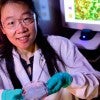
RNA-editing tool a fast, sensitive test for COVID-19
Researchers at Rice University and the University of Connecticut modify a gene editing tool to serve as a highly sensitive diagnostic test for the presence of the SARS-CoV-2 virus.

Wehmeyer team receives $1.5 million NSF grant
A team of researchers headed by Geoff Wehmeyer, assistant professor of mechanical engineering at Rice, has received a $1.5 million grant from the National Science Foundation’s Partnerships for International Research and Education (PIRE) program to support work on large-scale materials made from oriented carbon nanotubes.
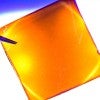
Solvent study solves solar cell durability puzzle
Rice engineers simplify the manufacture of high-efficiency perovskite solar cells.